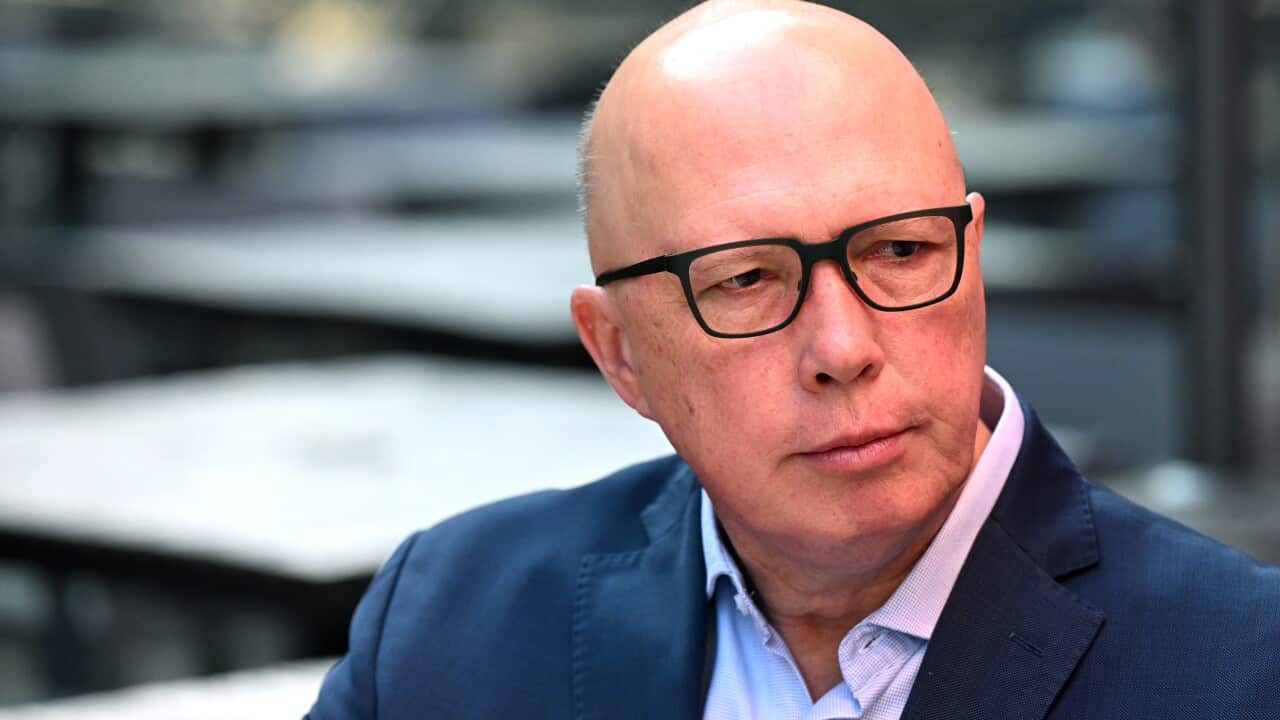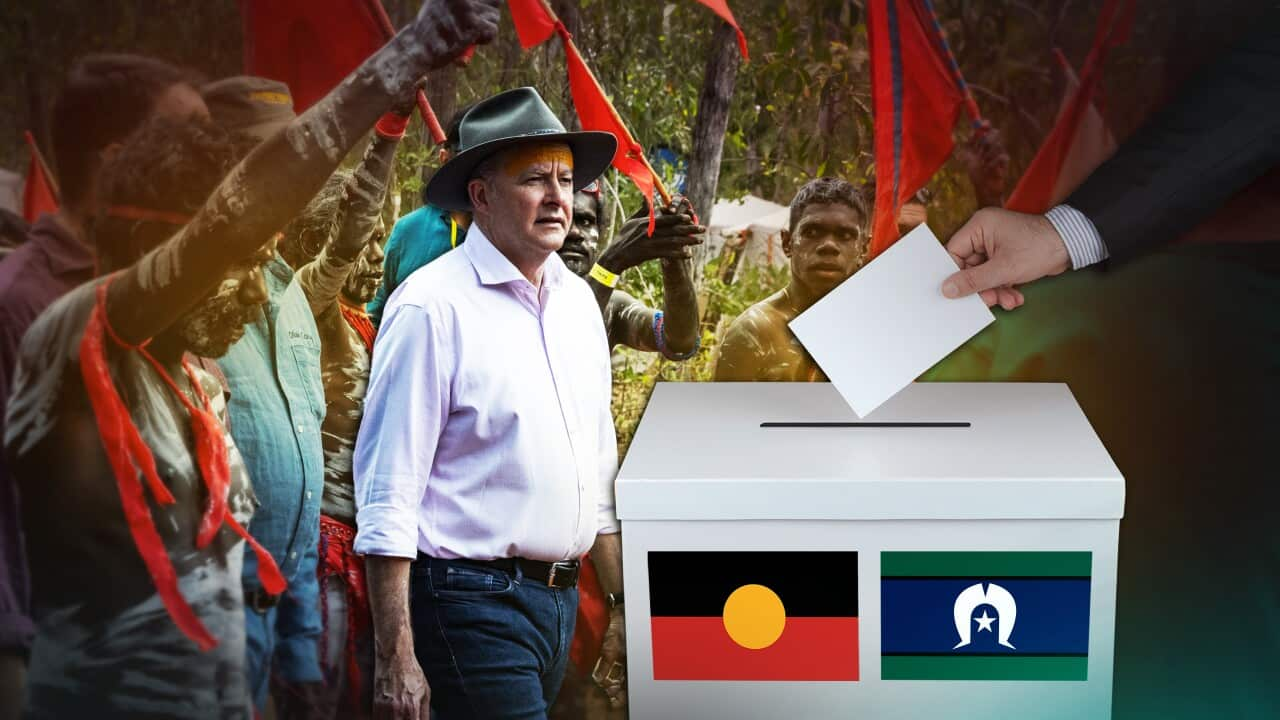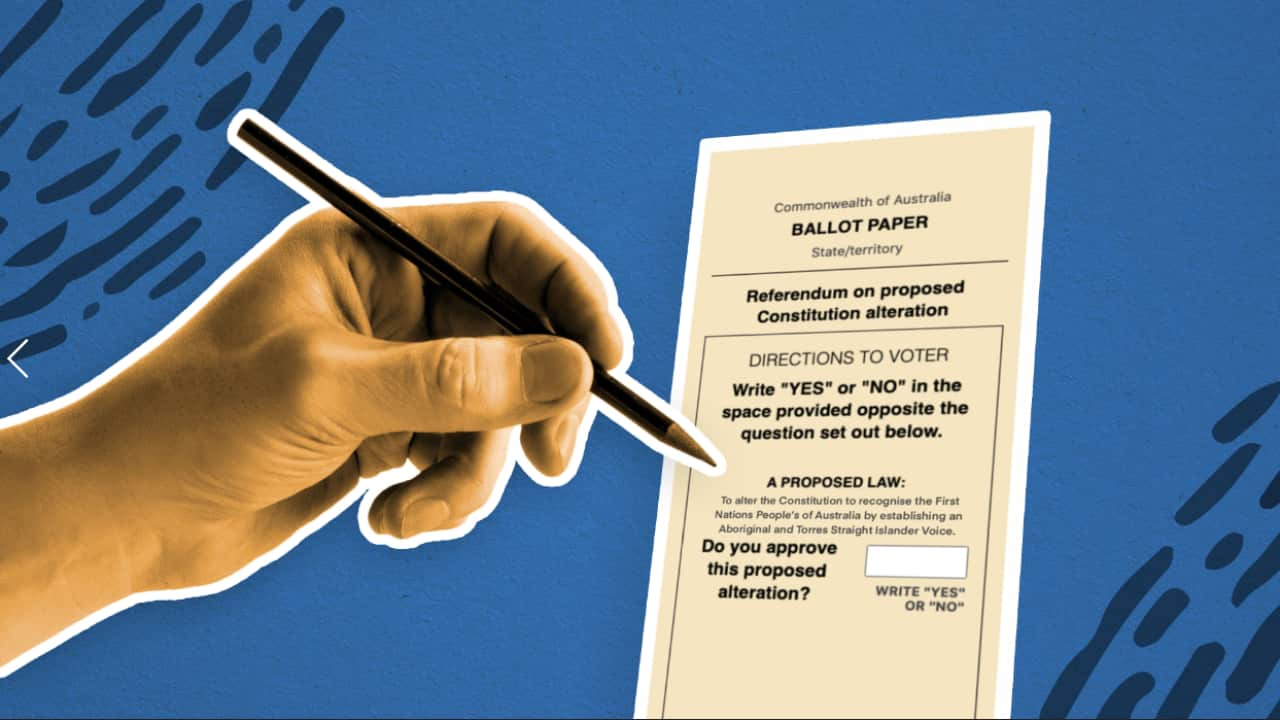Key Points
- Australians will vote on an Indigenous Voice to Parliament on 14 October.
- Yes and No groups are asking for fundraising help and are expected to ramp up grassroots campaigning.
- No campaigners are arguing the Voice will 'divide Australians along the line of race'.
Opposition leader Peter Dutton says Anthony Albanese has “six weeks to concentrate on providing the detail” on an Indigenous Voice to Parliament, after the Prime Minister fired the starting gun on the referendum race.
Albanese ended months of speculation on Wednesday by revealing Australians will head to the polls on 14 October, for the country’s first referendum in a generation.
Speaking in Brisbane several hours after the announcement, Dutton argued Albanese was “deliberately withholding” information from Australians over what they are set to vote on.
Labor says many details about how the Voice will operate will be worked through after a successful Yes vote but has offered some indication of its remit, such as hopes that the body would prioritise health, education, employment, and housing.
“It's clear that the Prime Minister now has six weeks to concentrate on providing the detail to the Australian public,” Dutton said.
“You can't go to an election, asking people to make the biggest change to our constitution in our nation's history, without providing the detail.
“I think most Australians, millions of Australians, will want to know what it is they're being asked to vote for, because it's not going to provide practical outcomes.”
Polling suggests the Yes campaign is heading for defeat, but Dutton denied that this was a foregone conclusion.
“There's no question that this will be a tight vote because the Yes campaign, thanks to the unions and thanks to big business bosses, has somewhere between $50 and $100 million,” he said.
No campaign lays blame at Albanese's feet
Opposition Indigenous Australians spokeswoman Jacinta Nampijinpa Price, a Warlpiri-Celtic woman, earlier claimed the "elite proposal" would "divide our country along the lines of race".
"It is that old rule of divide and conquer that I can't stand for. I'm not going to allow a line to run through the middle of my family within our Constitution," she said.
Leading No campaigner Nyunggai Warren Mundine said Albanese was responsible for creating division in Australia.
"This Prime Minister from day one attacked people who had a different opinion to him. [He] called them names, and that opened up the floor for the whole division to start, with all the horrible racial abuse, with all the horrible bigotry that's been going on out there. It's all Albo. He's the one who started this," Mundine said in Hobart.

Shadow Minister for Indigenous Australians Jacinta Nampijinpa Price Source: AAP / Richard Wainwright
Appearing emotional throughout the press conference, Mundine did not identify specific examples.
At the official announcement in Adelaide, Albanese said that, as Australians come together to answer the call for change, "we rise to the moment".
"Like the kangaroo and the emu on our coat of arms, they never go backwards. They just go forwards.
"When it’s done, when we see the joy and the celebration and the difference to people’s lives, the only question we [will] ask ourselves, when these changes occur, is, 'Why didn’t we do it earlier?'"
Yes campaign maintains enthusiasm
Uncle Charles Jackson said that, after a “struggle of about 200 years”, a No vote would be a “sad day” not just for Indigenous people, but Australia as a whole.
“[The Voice] is well overdue,” he told SBS News.
"Now, it gives the First Nations people the opportunity to be able to have input in terms of how [policy is] developed for the First Nations people, so that we can start closing the gap in this country.”
The polls have consistently shown the Yes camp headed for defeat, but it has insisted the public mood will change once the campaign has properly kicked off.
The referendum date announcement now opens the official campaign period, with tens of thousands of volunteers expected to be involved across Australia in the coming six weeks.
Yes campaigner Dwayne Coulthard told SBS News he was confident the tide would turn once the “message [is] out there”.
“It's just about getting your message out there. Talk, talk, talk,” he said.
“We want kitchen table conversations to take place. Everybody can have a yarn about what the Uluru Statement means.
"At the end of the day, polls will be polls. It's about people, it’s not about politicians. It's not about anything. It's about the people and the people will decide what this change means for them."
Megan Davis, Cobble Cobble woman and co-chair of the Uluru Dialogue, said First Nations people "should not have to move to Canberra to have a say in the laws and policies made about their lives".
Also speaking in Adelaide, South Australian Premier Peter Malinauskas said "the campaign to launch the 1967 Referendum also started right here on Kaurna Yurta land" and claimed South Australians "are capable of making the really big decisions at the really important moments".
"That's because South Australians have always been ready to lead, particularly when it comes to taking the aspiration of the fair go and transforming it into a living truth," she said.
"That's why this was the first place anywhere in the world to adopt universal franchise, giving the women the right to vote and the ability to run for parliament."
Migrant communities and the Voice
Migrant and refugee settlement agency AMES Australia said diverse communities would support the Voice if they were informed.
AMES Australia CEO Cath Scarth said surveys of people studying English or accessing migrant or refugee settlement services showed a need for more information on the Voice to be disseminated among culturally diverse Australians.
“The Voice is an important referendum that would give indigenous Australians a say on issues that affect them and have the potential to positively impact thousands of lives,” Scarth said.
“We at AMES are doing what we can to disseminate information but we think this should be a whole-of-community effort.
“It’s important that everyone eligible to vote in the referendum understands what the Voice means, what it is seeking to redress and the difference it might make in people’s lives,” Scarth said.
Tent Embassy says it wasn't consulted
Speakers from the Tent Embassy, known as the nation's longest-running Indigenous protest, said a constitutionally enshrined advisory body would only become "another governing body to deal with the Aboriginal issue".
Nioka Coe - the daughter of one of the four original protesters, Billy Craigie - said people at the embassy had not been consulted on the Voice.
"Our family connections, our nations, go back over 5,000 generations in this country," she told AAP.
"I don't think we need to be added to a constitution that oppresses our people.
"We've been here for 50 years, we still maintain the site, nobody's coming down here, no politician has come down here."
Coe said Indigenous senator Lidia Thorpe - also a 'no' campaigner and Aboriginal sovereignty advocate - was the only politician to occasionally visit the site, which sits just over a kilometre from Parliament House in Canberra.
She called the constitutional change a "tokenistic gesture" that would allow the government to say they were doing something to help Indigenous people.
"No discussion has happened with our people," she said.
Assistant Indigenous Australians Minister Malarndirri McCarthy said it would still be a challenge for the Yes vote to succeed.
"We see that this is an uphill battle, we have to keep going right up until the final moments of the referendum ballot," she told ABC TV.
Former prime minister John Howard on the morning of the announcement warned a successful voice referendum would lead to calls for a treaty.
"We don't have treaties with bits of ourselves and it only has to be stated to be realised as a complete absurdity," he told Sky News.
- With additional reporting by Anna Henderson, and AAP
Stay informed on the 2023 Indigenous Voice to Parliament referendum from across the SBS Network, including First Nations perspectives through NITV.
Visit the to access articles, videos and podcasts in over 60 languages, or stream the latest news and analysis, docos and entertainment for free, at the .











